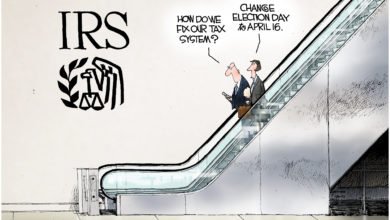Big Tech and Free Speech: How Both the Left and the Right Are Wrong
The war of words over online speech has been fierce and apparently unresolvable.
From the left, we have calls to crack down on “misinformation” and mounting pressure on internet companies to take down “dangerous” COVID-19 content especially.
President Biden went so far as to accuse Facebook of “killing people” by allowing “vaccine misinformation” on its platform.
In response to COVID-related episodes of Joe Rogan’s podcast, US Surgeon General Vivek Murthy argued that technology companies have a role in limiting the spread of COVID misinformation.
White House Press Secretary Jen Psaki also piled on, calling Spotify’s new policy introducing content advisory warnings at the beginning of Joe Rogan’s podcasts “a positive step, but there’s more that can be done.”
Meanwhile, from the right, we have denunciations of such Big Tech content moderation as violations of free speech. Several Republicans have even called for counter-legislation.
For example, in 2020 President Trump signed an executive order watering down Section 230 of the Communications Decency Act which grants social media companies immunity from liability for actions taken on their platforms by users.
Republican lawmakers in both Texas and Florida passed bills that give the government control over social media’s content moderation practices. Both bills have been challenged in the courts, but this hasn’t stopped Republican lawmakers in numerous other states from introducing similar legislation.
Republican Senator Josh Hawley has suggested using antitrust law to break up Big Tech companies over censorship, while others on the right have called for outright nationalization of Twitter and Facebook.
So who’s right here, the left or the right? Actually, they’re both wrong.
We can see how if we first realize that most, if not all, issues of speech rights actually boil down to issues of property rights.
The Where and the Who
In Ayn Rand’s Atlas Shrugged, when Hank Rearden refuses to host a journalist whose perspective he finds odious, he is implored to “tolerate the opinions of others and respect their right of free speech.” Rearden’s terse reply makes an important point:
“In my house?”
As economist and political philosopher Murray Rothbard wrote:
“Freedom of speech is supposed to mean the right of everyone to say whatever he likes. But the neglected question is: Where?”
In other words, what’s the venue? And most importantly: who owns that venue?
To unravel seemingly knotty problems of speech rights, “the proper course,” according to Rothbard, “is to find and identify the property rights involved. And this procedure will resolve any apparent conflicts of rights; for property rights are always precise and legally recognizable.”
Rothbard used this procedure to debunk a popular pro-censorship talking point: that free speech rights do not, in the words of Justice Oliver Wendell Holmes, “protect a man falsely shouting fire in a theater and causing a panic,” because such speech would present a “clear and present danger” to public safety.
As Rothbard demonstrated, public safety does not require any such loophole for censorship.
Again, the question is: who owns the venue? That question is key, because true ownership means having the right to dispose of one’s property however one chooses. The theater owner can admit or forbid whomever she wants on whatever terms and for whatever reason.
For example, if she provides her stage to speakers on condition that they refrain from expressing certain opinions, that’s her prerogative. That wouldn’t be a violation of the presenter’s speech rights, just an exercise of her own property rights.
After all, if someone barged into your apartment and started delivering a speech from your balcony, wouldn’t you reserve the right to kick that person out?
Once the ownership question is answered, the next question is: what contracts (whether explicit or implicit) has the theater owner made with others regarding the use of the theater?
For example, when someone purchases a theater ticket, the understanding is generally that the patron is exchanging money for a presentation, and that neither the owner nor the patron will disrupt that presentation.
To falsely yell fire in the theater would violate those terms. If the disruptor is a patron, the theater owner has the right to eject that person. If the perpetrator is the owner, the patrons have been defrauded and have the legally enforceable right to demand their money back.
In free societies, these are the norms that actually keep the peace in theaters, not any censorship powers of the government.
It is the maintenance, not the violation, of rights that ensures public safety.
The Unalienable Right to Tweet?
As we can see, Rothbard’s “find the property rights” method of solving speech rights puzzles is straightforward and powerful. Now let’s apply it to today’s contentious “online speech” policy debates.
Online freedom of speech, to paraphrase Rothbard, is supposed to mean the right of everyone to tweet whatever he likes. But the neglected question is: Where?
“Where?” can seem a tricky question when it comes to the internet, because we tend to think of “cyberspace” and “the cloud” in such ethereal terms.
But as a popular meme puts it, the “cloud” is just someone else’s computer. Whenever someone posts a tweet, a YouTube video, or any other piece of online content, it is hosted in a server farm somewhere. Servers are the venues, or “theaters,” for online speech. So the question is: who owns (or leases) the servers? The obvious answer is: the tech companies.
Just like the theater owner, online platform owners have the right to provide or deny access to whomever they want on whatever terms and for whatever reason. If they want to ban users for posting certain things, that’s their prerogative. Such a ban may be capricious, unfair, even condemnable. But it would not be a violation of the platform user’s speech rights, but rather simply an exercise of the platform owners’ property rights.
On the other hand, a government ban on such bans would be unjust. It would legally require companies to use their own servers to host content against their will. That would be just as much a violation of property rights as forcing a theater owner to provide her stage to certain speakers. In both cases, the government would be forcing people to platform, and thus participate in, certain speech. Thus, many proposed “anti-censorship” policies coming from the right would have the Orwellian effect of imposing compelled speech in the name of “free speech.”
Censorship by Bully Pulpit
This is not to say that online censorship is welcome. A major source of Big Tech censorship is indeed the violation of rights. But it’s not a matter of Big Tech violating the rights of users. It’s a matter of the government violating the rights of Big Tech.
When a government doesn’t like the content coming out of a media industry, it doesn’t always have to enact formal laws to censor it. Sometimes all politicians and bureaucrats have to do is make their displeasure over the content abundantly clear and to threaten (whether implicitly or explicitly) to crack down on the industry. Generally, a threat is all it takes to intimidate private companies into censoring themselves to preempt or prepare for the imminent crackdown.
In the 1920s, for example, there was a moral panic over indecency in movies and intense political pressure on the film industry, “with legislators in 37 states introducing almost one hundred film censorship bills in 1921,” according to Wikipedia.
“In 1922,” the article continues, “as they were faced with the prospect of having to comply with hundreds and potentially thousands of inconsistent, easily changed decency laws in order to show their films, the studios chose self-regulation as the preferable option, enlisting Presbyterian elder Will H. Hays, Postmaster General under former President Warren G. Harding and former head of the Republican National Committee, to rehabilitate Hollywood’s image.”
Under Hay’s leadership, the film industry would eventually adopt the Motion Picture Production Code (known as the Hays Code), which imposed strict content regulations on movies.
Then in the 1950s, another moral panic, this time over comic books and juvenile delinquency, culminated in Senate hearings that prompted the comic book industry to self-censor by creating its own version of the “Hays Code”: the Comics Code Authority.
Now the moral panic is over “misinformation,” but the government’s censorship playbook is largely the same. This recent year of especially egregious Big Tech censorship was preceded by a series of Congressional hearings pressuring the industry to self-regulate, “or else.” As Glenn Greenwald wrote in February 2021:
For the third time in less than five months, the U.S. Congress has summoned the CEOs of social media companies to appear before them, with the explicit intent to pressure and coerce them to censor more content from their platforms. On March 25, the House Energy and Commerce Committee will interrogate Twitter’s Jack Dorsey, Facebooks’s Mark Zuckerberg and Google’s Sundar Pichai at a hearing which the Committee announced will focus “on misinformation and disinformation plaguing online platforms.”
The Committee’s Chair, Rep. Frank Pallone, Jr. (D-NJ), and the two Chairs of the Subcommittees holding the hearings, Mike Doyle (D-PA) and Jan Schakowsky (D-IL), said in a joint statement that the impetus was “falsehoods about the COVID-19 vaccine” and “debunked claims of election fraud.” They argued that “these online platforms have allowed misinformation to spread, intensifying national crises with real-life, grim consequences for public health and safety,” adding: “This hearing will continue the Committee’s work of holding online platforms accountable for the growing rise of misinformation and disinformation.”
With highly credible threats like these from Congress, plus the intimations emanating from President Biden’s aptly-named bully pulpit, it should be no surprise that Big Tech is “self-”censoring exactly the kind of content that the government wants them to.
It may not involve laws or executive orders, but such “censorship by saber-rattling” is censorship nonetheless.
The Ultimate Censor
To return to the theater analogy, imagine if a mob boss got an anti-mafia speaker de-platformed by darkly warning the theater owner, “That’s a nice theater you have. I’d hate for something to happen to it…”
Even if the gangster didn’t rough up the theater owner or brandish a gun, that would be a crime. Coercion by credible threat, even if only a clearly implied one, is a rights violation.
But again, it’s not the platform owner violating the rights of the speaker. It’s the censorious thugs (whether in the government or the mafia) violating the rights of the platform owner.
Now, in the above scenario, what would be the best path to justice? Should the community unite to defend the theater owner against the mob boss? Or should they issue their own threat against the already-beleaguered theater owner for “persecuting” the speaker?
Many Republican proposals to “fight Big Tech censorship” are tantamount to doing the latter.
Now, this is not to paint the Big Tech companies as wholly innocent. If they had braver leadership, they would have pushed back instead of being so easily intimidated. (Maybe Elon Musk will help Twitter grow a spine.) Plus, some within the companies are already ideologically predisposed to this kind of censorship anyway. And some Big Tech companies have even pushed for regulation, probably because it would burden their small competitors more than them.
But these problems too would only be made worse, not better, by getting the government even more involved. Indeed, doing so will inevitably backfire on the conservatives and libertarians who push for that. Any additional government power to regulate online platforms will likely be twisted to censor critics of the government more, not less.
Yes, Big Tech has been censoring its users to manipulate public discourse and promote an agenda. Yes, it’s condemnable. But (A) it is also within their property rights, and (B) they are doing it under duress. They censor because they are censored.
To fight online censorship, we must strike its roots. And those roots are to be found, not in the Valley, but in the Swamp.
Content syndicated from Fee.org (FEE) under Creative Commons license.
Agree/Disagree with the author(s)? Let them know in the comments below and be heard by 10’s of thousands of CDN readers each day!





This article hits the nail on the head. Censorship, from right or left, is not the answer. Public pressure must force the Big Tech providers to be more fair about providing their product. They must become aware that “censorship” is not their mission but insuring proper presentation is. For example, I should not have to agree with you but I should grant you your right to an opinion. Our internet communications are not a crowded theater but our own individual forums. We should be free to express our opinions, regardless of whether others, form whatever side, believe. Freedom of speech and expression ends when we are denied access to present our views. This is true whether on the stage at a college or on FACEBOOK.